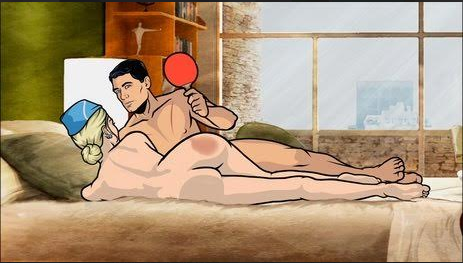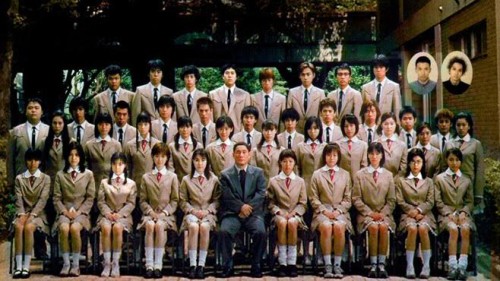I get the imagery, but this movie poster doesn’t really have a horror vibe to it.
This guest post by Belle Artiquez appears as part of our theme week on Violent Women.
Teeth (2007) is a horror film that was directed by Mitchell Lichtenstein based on the story of a young girl who finds out she has teeth inside her vagina. Mind blowing stuff, I know. It was not a good movie, it was not even a good story, in fact it was quite the opposite and anybody who has seen it will tell you that it was pretty much one of the worst movies ever. However, I’m one of those people who may hate watching a movie, may even feel bored during it, but will talk about it for months after if the correct themes are there. Teeth is one of those movies, and I’m still under the assumption that many people, myself included for a while, took away from the film something that was irrelevant, we missed the point, we missed the real issues the film was exploring, even if it was done in a very, very bad way.
Dawn, a young virginal, religious girl wishes to stay just that for as long as possible–society rejoices, she is following the rules! She meets a young man at her abstinence group and although he agrees to wait with her, on a romantic date with woodlands and waterfalls he ends up forcing himself on her because she’s still “pure.” Thus begins the sexual assaults literally thrown at the young Dawn. It is during this first forced sexual encounter with a boy she felt safe with that she realizes, to her and his horror, that she has teeth inside her vagina, that literally bite off the boy/rapist’s penis. We get a glimpse of his ripped-off genitals (and it’s not the only time we see gory, bloody castrated penis), so while this movie isn’t directed toward the male gaze in a conventional way (we never see Dawn’s naked body) it might be done in a horrific way.
Something new for the male gaze to enjoy…
Already I’m seeing a lot of messages and themes that are incredibly familiar. To start we have society’s golden girl, the girl that wants to wait, wants to be virtuous and good and clean so that when the right man comes along he won’t feel like he’s gotten soiled goods (I write gritting my own teeth…pun totally intended). Then we have sexual themes thrown at her; she is hit by the very thing that asked her to stay clean, virginal. She is forced to be sexual. She is inundated with sexual activity, as are all women who walk the earth–we are bombarded with images of sexualized women in underwear, in TV and magazine advertisements, in film and music videos, these are telling us that this is what society wants, sexual women. But we know that society also wants us to be virginal women to save ourselves. It’s a conundrum, one that Dawn faces head (or vagina) on. She is forced to confront these opposing views, and her body reacts the only way it knows how, it bites the penis of society, it castrates the men that want to turn her into something she doesn’t want to be: a sexual young woman.
I know, seeing your vagina for the first time can be bizarre, especially if there’s teeth in there, but I promise–you will get over it.
Not only is Dawn violated by a little boy who thought he was man enough to get some from a girl who actively told him she wouldn’t give him anything, she is also abused by her gynecologist, a healthcare professional who is far from professional. During this scene I felt extremely uncomfortable, it was too…familiar. Dawn seeks medical advice about her vaginal teeth, telling the doctor that she thinks ‘there might be something weird going on’ and I’m only going to assume that it was her first visit (she’s a virgin remember) so probably felt a wave of emotions from fear to pure horror at what was going to happen. Many first visits for women are filled with these emotions. But when her doctor takes his gloves off and continues to mess around down there, things really get weird and the wonderful doctor ends up having his fingers bitten off (serves him right too). Now, I’m not going to say this was exactly like my first experience with a gynecologist, far from it, however, it was equally as uncomfortable, and to this day I feel like something was amiss. I was nervous,very very nervous. I was literally a ball of emotions, on my own, and I’m only going to assume the male doctor noticed this because instead of offering a female nurse, or even trying to make me feel less exposed, he called in two female nurses to literally hold my legs open as he examined me, with no blanket, no comfort, just a horrifying shame that has been with me since that day (over a decade ago). So I understand why that scene was so horrific for me and not other people who laughed their way through it, but this only serves to prove that women are capable of understanding the discomfort of the plot, of the numerous sexual assaults Dawn faces, the reaction she has to her own body (hating and simultaneously fearing it) and then her final understanding that she has to own it, be in control of it and her sexuality. She has to have agency in her violent vagina because she knows how powerful it is.
If only we all had her power, and yes it pretty much is a super power!
She arrives, shaken and terrified after her gyno visit at a boys house, she takes a bath and comes out to find that said boy has lit around a hundred candles, stuck on ridiculous music and is waiting expectantly for sex. She is still shaken (who can blame her?) so he offers her a pill and wine to relax, or drug her. She assumes he has her best interest at heart so accepts, I know right? More fool her..but I did say it was a terrible movie. It gets even worse as this encounter unfolds. She falls asleep/unconscious only to wake and find him fondling her breasts, and although he asks her for consent and she tells him not to stop she is still under the influence of drugs and alcohol so cannot legally give consent. They have sex. He ‘conquers’ her, becomes the ‘hero’ (his words!) and gets to keep his penis. The next morning things don’t go so smooth, during consensual sex he answers the phone still inside her (big mistake) and begins to gloat and brag about it. His penis meets the same fate as the previous two men and he ends up being not quite the conquering hero he first thought, he will be stroking this male ego no longer.
I honestly don’t know why there’s a crunch, but again, bad movie.
From here Dawn eventually rids herself of her abstinence ring; if society wants a sexual girl they were going to get one, but only on her terms. If men are going to force it, they’re going to lose it, simple as that. The male fear of powerful vaginas really takes on a whole new meaning with this film; it portrays the many anxieties men and the patriarchy have where women are concerned. If women start to realize their inherent power, their violent vagina’s, then some men fear they will be cut down, castrated because of it. The fear lies within the notion that both sexes cannot have equal control. He will take (think virginity), she will give, not the other way around. That’s the dynamic society is used to, so a horror within the film is also connected to the fact that men fear the vagina and its power, they fear what will happen to them and their masculinity if the vagina (women) acknowledges its own power. The film blatantly gives shots of castrated male genitals, bloodied, and disgusting (I’m not a gore fan), and while many men will feel a kind of sympathy pain for the characters (who are rapists by the way), and apologise for showing it in blogs because the writer too felt a pain when posting it, I’m left wondering why women are expected to watch rape in film and TV and not feel the same? Because let’s be honest, it’s not everyday that we see mutilated male genitals, but the violent rape of a women which portrays the same kind of genital pain…yeah that’s pretty common. But for some reason neither of these things represent the same pain.
Dawn indeed does end up using her violent vagina as a tool of revenge and protection for other women. She actively engages with men whose intentions are not good just so she can castrate them in order to protect the future women these men would harm. She totally owns it, she takes on the violent nature of her unique vagina and uses it for good.
Now that’s the face of a woman who is owning her sexuality, even if it is a violent one!
Teeth was categorized as a feminist horror film, and I can see why many people didn’t quite agree with that–Dawn is sexually assaulted a lot, she is not in control of her own sexual behaviour (for most of the movie) and she certainly isn’t a feminist herself; I don’t think the literal biting off of men’s penises constitutes as feminist film. However, her having to come to terms with a part of herself that society both worships and fears is quite the feminist argument. One that rings true to nearly every woman on the planet. On the surface though this film just seems like a crude horror that involves a deadly vagina, a violent, razor sharp vagina. But maybe the horror of this film lies somewhere in the messages it portrays; maybe the real horror is the shit this poor girl, who just wanted to play by the rules, has to put up with on a daily basis, and as such, what women everywhere have little option but to just deal with, from the constant sexualization of women in every aspect of society, the slut shaming, the butt grabs instead of handshakes, the boob stares instead of eye contact, the cat-calling and street harassment, to the flat out sexual assault, the (not at all) blurred lines of consent, the daily beating down of women for having vaginas and showing some skin. Maybe that was the true horror of this movie and not the fact that a girl who endured all of this had the ability to cut some men down with the very thing they thought they had control of and a right to: her violent and powerful vagina.
Don’t they all…
Belle Artiquez graduated from film and literature studies in Dublin and since has continued her analysis and critique of film, TV, and literature (mainly in the area of gender politics and representations) as well as cultural and societal critiques on such blog spots as Hubpages and WordPress.


























